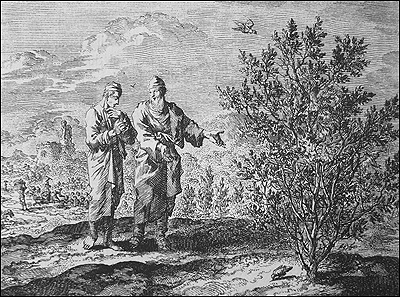
Home > Jesus > Parables of Jesus > Parable of the Mustard Seed
 Parable of the Mustard Seed
Parable of the Mustard Seed
Another parable put he forth unto them, saying, The kingdom of heaven is like to a grain of mustard seed, which a man took, and sowed in his field: 32 Which indeed is the least of all seeds: but when it is grown, it is the greatest among herbs, and becometh a tree, so that the birds of the air come and lodge in the branches thereof. — Matthew 13:31-32, KJV
This parable appears in all three of the synoptic gospels, and forms a pair with the similarly themed parable of the leaven in Matthew and Luke. In each, separate analogies are used to illustrate the progression and influence of the kingdom of God; specifically the expansion of the gospel message throughout the world despite very modest beginnings, and its permeating influence in the heart of the believer. The parable of the mustard seed uses the example of a small, seemingly insignificant seed growing into an unusually large mustard plant.
The field here represents the world. The mustard seed symbolizes the gospel message, and the man sowing the seed represents Christ or other means through which the gospel is delivered. The greater advancement of the kingdom of heaven, from its inauguration at the birth of Jesus Christ through its consummation at His second coming, is also reflected.
A number of botanists and biblical scholars identify the mustard tree of the parable as the black mustard, as it best fits the general characteristics described within and is common in Israel. Black mustard is a prolific self-sower; gardeners will often try to harvest the seed soon after the plant bolts in the summertime to avoid certain overgrowth in the next season. Its germination rate is high and the plant grows extremely quickly; a seed could conceivably hit the ground one day and sprout the next, and the mature plant is pretty much irresistible once it gets going.
Through this analogy Jesus encouraged His disciples by showing that despite their number being small, they represented a body of believers that would grow exponentially and ultimately be utilized in bringing millions to salvation. In exactly the same way, a believer’s faith starts small at the initial exposure to the gospel and strengthens. As potential for life exists in the seed, a glimmer of true faith is capable of transforming the human heart and developing in it a new nature, one that ultimately leads to eternal life in Christ Jesus.
Some commentators have taken exception to the fact that the Lord calls the mustard seed “the least of all seeds” when in fact there are smaller seeds. However among “herbs” typically planted in a garden environment, which is the context here, the mustard seed is the smallest you will find. The description is accurate even though Jesus’s primary concern here was not to teach science. The point is that the seed is tiny and represents a very modest catalyst.
While a large mustard plant can grow up beyond six feet, some occasionally will grow in excess of 12 feet, assuming the characteristics of a tree and substantial enough that birds could be supported within its branches. And what of these birds? Their presence demonstrates the inclusiveness of the kingdom of heaven, as it blesses all who seek refuge there. Jew or gentile, all may ultimately enjoy its benefits under God's covenant of grace. Even the nonbelieving world is positively affected by its influence—certainly Christianity is a restraining force against Satan’s deceptions and destructiveness.
Other commentators have pointed out that chapter 4 of Daniel provides a good parallel. Here the Babylonian king Nebuchadnezzar dreamed of an enormous tree, in and under which all creatures were protected and provided for. Daniel’s interpretation of the dream revealed the tree to be the king and by extension Babylon itself, with its power and influence extending far and wide. Just as the birds and beasts of the dream were sustained by the tree, other peoples and nations benefited from the proximity and stabilizing presence of the Babylonian Empire. The prosperity and security it had established extended beyond its particular borders.
The perseverance and expansion of the gospel as shown by the parable should be a comfort to believers. No matter how bad things get in the world, no matter the amount of oppression, corruption and godlessness we observe, we have the assurance that the kingdom only grows stronger over the course of time until “every knee shall bow… and every tongue shall give praise to God” when it culminates at the end of the age with the second coming of Christ.
From humble origins, the kingdom of God has grown just as Jesus said it would. By living our life to bring glory to God and share His word, we play our own important role in continuing that growth. Christians are obliged to sow the seed of the gospel, and should find encouragement—as the original disciples did—in the fact that so much can be gained from so little. Grace needs only a small foothold in the sinner’s heart to bring him to justification in Christ Jesus, and who can say what the widespread influence of one redeemed sinner could be?
Image:
Luyken, Jan (1649-1712); Parable of the Mustard Seed; Medhurst, Phillip (attribution)
Scripture Alone • Faith Alone • Grace Alone • Christ Alone • To the Glory of God Alone
Most scripture quotations taken from the New American Standard Bible® (NASB)